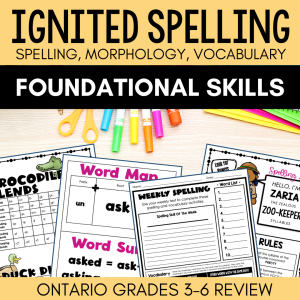Are you struggling to teach spelling skills in your classroom? Exciting changes are happening in Ontario’s education landscape, and it’s not just limited to the early grades. If you’re a teacher working with students in grades 3 to 6, you’ll want to pay close attention to the transformative updates in the Ontario Language Curriculum for 2023. These changes are set to reshape how we approach teaching spelling and vocabulary skills, bringing a fresh perspective and innovative methods into our classrooms.

Building a Strong Foundation in Spelling Skills
With the new curriculum, a significant shift is occurring in how we nurture spelling skills. We’re bidding farewell to traditional spelling tests and the old-fashioned drill-and-kill memorization techniques of the past. Instead, we’re embracing structured literacy and the science of reading to build a solid foundation for spelling proficiency among our students.
The challenge arises from the fact that the transition leaves many of our grade 3 to 6 students without the foundational skills needed to tackle grade-level content. While they might possess some intuitive understanding of spelling and phonetics, these skills have developed without explicit instruction. As a result, they may lack the vocabulary and comprehension required for more complex spelling concepts like blends, syllables, and digraphs.
Unlocking the Power of Patterns
To bridge this gap, we’re adopting a hybrid approach that combines explicit instruction with the existing knowledge base of our students. We’re not taking students all the way back to square one, but we are ensuring they have the tools to understand and manipulate language effectively.
No longer will spelling education revolve around memorizing specific words for weekly tests. Instead, the focus is shifting towards comprehending spelling patterns, rules, and concepts. By teaching students these underlying principles, they gain the ability to decode unfamiliar words and apply these patterns to a broader range of words. This approach sets them up for success when encountering new vocabulary.
Engaging Learning Methods
The new curriculum encourages a dynamic learning environment. We’re steering away from rote worksheets and instead focusing on engaging activities that encourage critical thinking and application of spelling rules. Students will no longer passively consume spelling rules; they will actively understand, practice, and internalize them.
Integration with Reading and Writing
Spelling is no longer an isolated subject. It’s now a bridge connecting reading and writing. Students will see the relevance of spelling in their reading comprehension and written expression. This holistic approach ensures that students grasp the importance of spelling in both literacy domains.
Ignited Spelling: Your Solution
Now, you might be wondering how to implement these changes effectively in your classroom. This is where Ignited Spelling comes in. It’s designed to align seamlessly with the new curriculum and provides a structured framework for teaching spelling and vocabulary skills.

Ignited Spelling offers a multifaceted approach to spelling education, which includes shared reading activities, explicit lessons, hands-on practice, and engaging center activities. This comprehensive approach replaces traditional spelling programs, ensuring that students receive the foundational knowledge and skills they need to succeed.
Implementation in Your Classroom
Integrating Ignited Spelling into your classroom is straightforward. You’ll find that your weekly plan can accommodate the new curriculum seamlessly. By following a simple adjustment, you can incorporate Ignited Spelling into your existing Ignited Literacy program, ensuring your students get the best of both worlds.
Spelling Skills Assessment and Reporting
Assessing your students’ progress is vital. Ignited Spelling offers various assessment opportunities, including the weekly practice pages, summary tasks, and vocabulary assessments. Additionally, you can monitor their application of spelling skills in their daily writing activities.
Conclusion: Embracing Change in Teaching Spelling Skills
Change may seem daunting, especially when it involves reimagining how we teach core subjects like spelling. However, these changes bring an exciting opportunity to make learning more engaging, inclusive, and effective. By adopting Ignited Spelling and aligning with the new Ontario Language Curriculum, we’re empowering our students to become confident and proficient spellers.
So, as educators, let’s embrace this transformation and embark on a journey to revolutionize spelling education for junior grades in Ontario. Together, we can ignite a passion for learning and equip our students with the skills they need to thrive in the ever-changing world of language.
Watch It On YouTube






